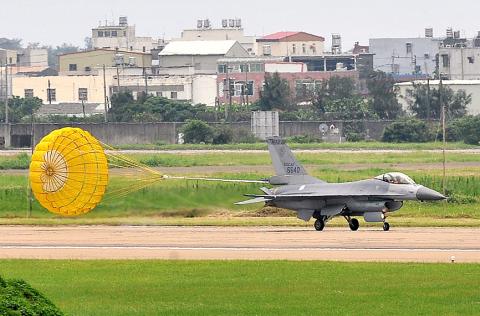The air force will procure the full US$5.2 billion upgrade package for its fleet of F-16A/B fighter jets notified to the US Congress in September last year, but will do so in two phases, the Taipei Times has learned.
This latest twist in the F-16 saga comes after reports in February said that the Executive Yuan had decided it would give the air force only US$3.7 billion to upgrade its 145 F-16A/Bs, forcing the military to trim some of the articles included in the US$5.2 billion package, which includes Active Electronically Scanned Array (AESA) radars, electronic warfare suites, air-to-air missiles and, more controversially, a variety of Joint Direct Attack Munitions (JDAM) kits.
Air Force Command Headquarters announced early last month that it had received an official answer from the US, which reportedly contained articles that reflected the US$3.7 billion allocated by the Executive Yuan.

Photo: Chien Jung-fong, Taipei Times
Taiwan is currently evaluating the contents of the letter and is expected to sign the letter of agreement within 45 to 60 days.
However, a defense industry source told the Taipei Times yesterday that Taiwan would still procure the entire US$5.2 billion upgrade, but would do so in two phases, with the second phase — worth about US$1.5 billion — taking place in two years.
Because the full package has already been notified, no second notification will be necessary for Taiwan to submit a letter of agreement for the second phase, the source said.
The electronic warfare suite is being specifically designed for Taiwan and will not be ready until 2016 or early 2017, the source said, adding that the development cost for the system is part of the retrofit package. The same suite would be installed on the F-16C/Ds that Taiwan has been seeking since 2006.

Taiwan has received more than US$70 million in royalties as of the end of last year from developing the F-16V jet as countries worldwide purchase or upgrade to this popular model, government and military officials said on Saturday. Taiwan funded the development of the F-16V jet and ended up the sole investor as other countries withdrew from the program. Now the F-16V is increasingly popular and countries must pay Taiwan a percentage in royalties when they purchase new F-16V aircraft or upgrade older F-16 models. The next five years are expected to be the peak for these royalties, with Taiwan potentially earning

STAY IN YOUR LANE: As the US and Israel attack Iran, the ministry has warned China not to overstep by including Taiwanese citizens in its evacuation orders The Ministry of Foreign Affairs (MOFA) yesterday rebuked a statement by China’s embassy in Israel that it would evacuate Taiwanese holders of Chinese travel documents from Israel amid the latter’s escalating conflict with Iran. Tensions have risen across the Middle East in the wake of US and Israeli airstrikes on Iran beginning Saturday. China subsequently issued an evacuation notice for its citizens. In a news release, the Chinese embassy in Israel said holders of “Taiwan compatriot permits (台胞證)” issued to Taiwanese nationals by Chinese authorities for travel to China — could register for evacuation to Egypt. In Taipei, the ministry yesterday said Taiwan

Taiwan is awaiting official notification from the US regarding the status of the Agreement on Reciprocal Trade (ART) after the US Supreme Court ruled US President Donald Trump's global tariffs unconstitutional. Speaking to reporters before a legislative hearing today, Premier Cho Jung-tai (卓榮泰) said that Taiwan's negotiation team remains focused on ensuring that the bilateral trade deal remains intact despite the legal challenge to Trump's tariff policy. "The US has pledged to notify its trade partners once the subsequent administrative and legal processes are finalized, and that certainly includes Taiwan," Cho said when asked about opposition parties’ doubts that the ART was

If China chose to invade Taiwan tomorrow, it would only have to sever three undersea fiber-optic cable clusters to cause a data blackout, Jason Hsu (許毓仁), a senior fellow at the Hudson Institute and former Chinese Nationalist Party (KMT) legislator, told a US security panel yesterday. In a Taiwan contingency, cable disruption would be one of the earliest preinvasion actions and the signal that escalation had begun, he said, adding that Taiwan’s current cable repair capabilities are insufficient. The US-China Economic and Security Review Commission (USCC) yesterday held a hearing on US-China Competition Under the Sea, with Hsu speaking on